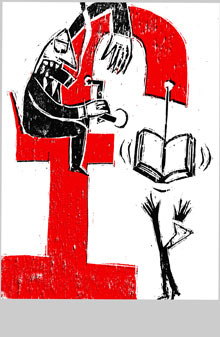For years, it has been ridiculed as a 1960s embarrassment. Now Transcendental Meditation is back in a big way. So were those hippies on to something all along?
By Laura Tennant
Sunday, 10 July 2011 The Independent
Remember M-People's 1995 Top 10 hit instructing you to "search for the hero inside yourself"? A decade-and-a-half on, it seems that things have changed – these days, it's not so much a hero as a guru that many of us are hoping to internalise. For strange as it may sound, among those of us who seek to surf the zeitgeist, the most fashionable thinker of 2011 may turn out to be Maharishi Mahesh Yogi, the founder of the Transcendental Meditation movement – and the fact that he passed to a better place in 2008 doesn't appear to have discouraged us one bit.
TM, as its followers call it, is rapidly moving from kooky margin to respectable mainstream thanks largely to a burgeoning body of scientific research which indicates that regular meditators can expect to enjoy striking reductions in heart attack, stroke and early mortality (as much as 47 per cent, according to one study). And the apparent benefits don't stop there: according k to a pilot study just published in the US journal Military Medicine, veterans of the Iraq and Afghanistan wars showed a 50 per cent reduction in their symptoms of post-traumatic stress disorder after eight weeks of TM.
Meanwhile, educational establishments which introduce a "quiet time programme" – as did Visitacion Valley Middle School in San Francisco – report drops in fights and suspensions, increased attendance and improvements in exam results. In this country, the Maharishi School in Ormskirk, Lancashire, gets glowing reports from Ofsted and achieves exceptional academic results.
An estimated four million people now practise TM globally – 20 minutes twice daily, as per the Maharishi's prescription – many of them over the course of many decades, and there are some famous, and rather surprising, names on the list. Clint Eastwood, for example, has been doing it for 40 years, a fact he vouchsafed via video link at a fund-raising dinner for the David Lynch Foundation, an organisation set up by the film-maker to teach TM to school children, soldiers suffering post-traumatic stress, the homeless and convicted prisoners. Other celebrity adherents include Paul McCartney, Russell Brand, Martin Scorsese, Ringo Starr, Mary Tyler Moore, Laura Dern and Moby.
TM reaches far into the rational and sceptical world, too; the American philosopher Daniel Dennett does it, as does Dr Jonathan Rowson, head of the Social Brain project at the Royal Society for the Encouragement of Arts, Manufactures and Commerce (RSA) and a chess grandmaster (more from them later). Now a psychiatrist with 30 years' clinical experience, Dr Norman Rosenthal has written a book, Transcendence: Healing and Transformation through Transcendental Meditation, which gathers all the available evidence for TM and urges healthcare professionals to offer it to patients suffering from mental illnesses ranging from mild depression to bipolar disorder.
While the research on the health benefits of TM is fascinating, there's another, more compelling, reason why meditation is in the air just now. Done consistently, it seems to offer some sort of corrective to modernity, a respite from anxiety and the ability to really, truly relax, without chemical assistance; a break from our constant, restless and often doomed aspirations to be thinner, richer and more popular on Facebook; the welcome discovery that happiness is to be found not in retail therapy, but within.
Those spiritual cravings explain why Rosenthal's book is now riding high at number 14 on America's Publishers Weekly non-fiction list. And according to TM UK's official representative, David Hughes, there's a similar surge of interest on this side of the Atlantic; figures are vague, but he reports that "there's definitely an ongoing increase month by month" to the estimated 200,000 people who have learnt TM in the UK since 1960.
I first began to ponder the notion of meditation while writing a piece on solitude. While aloneness might not be a state that comes naturally to most humans, without it, mental-health experts believe, it is impossible to be creative or even really to know oneself. It was the sheerest coincidence that on the day I contacted TM's UK website they were preparing for Dr Rosenthal's press conference.
My own adventures in TM began soon after – but first, a little history for readers too young to remember TM's 1960s "first wave". Many of those who do recall the arrival of the Maharishi Mahesh Yogi in Britain in 1967 understandably feel that TM has been discredited beyond hope of rehabilitation by years of embarrassing rumours and implausible claims. Long before his death, the Maharishi's leadership of the movement had been associated with an unseemly desire to cash in on his celebrity followers – including, most famously, The Beatles (as well as McCartney, George Harrison continued to meditate every day until he died) – and the accumulation of a substantial personal fortune (in 1998, the movement's property assets were valued at $3.5bn). Sexual impropriety was also alleged; The Beatles were said to have fallen out with the Maharishi at least partly because of his attempted seduction of Mia Farrow, or possibly her sister Prudence, at his ashram in India.
Generations of Oxford undergraduates have joked about nearby Mentmore Towers, the Buckinghamshire mansion where the Maharishi installed 100 young men in 1979 to practise continuous, advanced-level TM (they've since been retired). The inherently comical idea of yogic flying (actually yogic hopping) has always strained credibility, as has the Maharishi's claim that if 1 per cent of the globe's population practised TM, the flow of "good vibrations" would bring about a universal state of "bliss consciousness".
Then there was the Natural Law Party, the "political arm" of the TM movement, extant from 1993 to 1999 and set up, according to David Hughes, to "get the message across" about TM and also, bizarrely, the dangers of GM food. The party was a resounding flop – testament, perhaps, to the British mistrust of mysticism and religiosity in politics.
TM also infuriates many militant atheists in a way that "mindfulness meditation", which draws on the Buddhist tradition, does not. Sam Harris is a neuroscientist and the author of books including The End of Faith and The Moral Landscape and a blog, On Spiritual Truths. In a recent piece for The Huffington Post entitled "How to Meditate", he remarks that: "Even an organisation like Transcendental Meditation, which has spent decades self-consciously adapting itself for use by non-Hindus, can't overcome the fact that its students must be given a Sanskrit mantra as the foundation of the practice. Ancient incantations present an impediment to many a discerning mind (as does the fact that TM displays several, odious signs of being a cult)."
Against these objections should be set the fact that people who start meditating tend to keep at it, often for the rest of their lives – a phenomenon suggesting that its benefits, while slow and cumulative, are palpable. The aforementioned Dr Rowson, who was British chess champion from 2004 to 2006, has been practising TM for 14 years. "I'd say that TM is physiologically very powerful, and spiritually a bit shallow," he says. "There are few things better for giving you a feeling of serenity, energy and balance. But I don't think it gives you any particular insight into your own mind."
It seems that scientific research backs his experience. The bestselling Dr Rosenthal came to public prominence through his work on seasonal affective disorder at the National Institute of Mental Health in Maryland, where he also pioneered the use of light therapy to treat it. His interest in TM was piqued when one of his bipolar patients described how practising TM alongside his regular medication had helped him move from "keeping his head above water" to feeling "really happy 90 per cent of the time".
Dr Rosenthal began to examine the large body of scientific research into the effects of TM on long-term users, and also to collect anecdotal evidence from meditators. His book Transcendence is the result, though as he acknowledges in his introduction, "Some of you may find this preview of the benefits of TM – this seemingly simple technique – exaggerated and hard to believe. I don't blame you." He draws on 340 peer-reviewed research articles to back his argument that TM can not only reduce the incidence of cardiovascular disease, but also assist in treating addiction, post-traumatic stress disorder, ADHD and depression, not to mention helping high-functioning individuals achieve greater "self-actualisation".
Listening to Rosenthal talk, I was impressed by his medical experience and academic credentials. Yet TM's ability to reduce one's risk of heart disease interested me less than its effects on mental wellbeing and creativity. Maslow's famous hierarchy of needs described "self-actualisation" as the thing humans seek when their six basic needs for food, safety, physical shelter, love, sex and a sense of belonging have been met. Like many other evolved and somewhat spoilt beneficiaries of the affluent West, I too wanted to self-actualise, and I hoped TM could help me do it.
Acquiring the skill isn't difficult, but it does require time and money. Fees are charged on a sliding scale according to income – courses start at £190 for children and rise to £590. Initiates attend four sessions, and are given a Sanskrit mantra, which is repeated soundlessly in one's head while meditating. The objective, according to TM's website, is that "the mind effortlessly transcends mental activity and experiences pure consciousness at the source of thought, while the body experiences a unique state of restfulness".
The first thing I noticed was that repeating the "sound vibration" of my mantra took me to a place which was neither wakefulness, sleeping nor dreaming. Over the course of subsequent sessions I've regularly become detached from my physical self and dipped in and out of this "fourth state" of consciousness. Allowing sometimes painful thoughts and feelings to come to the surface has bought tears to my eyes, but I've also reached important decisions.
A month into my practice, I have not so far experienced "bliss", a condition beyond time and space in which one is not "ebulliently happy", as Rosenthal puts it, but "calm and alert"; a state, he explains, in which one realises that "just to be is a blessing". But I'm prepared to believe the effects are gradual and I'm struck by the fact that I no longer resent the necessary investment of time.
The effectiveness of this daily "yoga for the mind", as the meditator and fashion designer Amy Molyneux calls it, is the reason, I think, that thousands of people can ignore the Maharishi's theory in favour of his practice. But depending on your point of view, TM's spiritual aspects remain problematic. When the Maharishi School was granted "free school" status, for example, allowing it to scrap its annual £7,600 fees and receive Government funding, hackles were raised in more determinedly sceptical quarters.
Should we be concerned that a school infused with the TM philosophy is getting Government funding? To find out whether the organisation merited the accusations of "cultishness" levelled at it, I spoke to Suzanne Newcombe, a research officer for Inform, the charity run by the London School of Economics to provide information about new religious movements or "cults". "We've had a certain number of complaints from members of the public about the fee structure," she told me. "And occasionally relatives may be anxious about people who commit their lives to the movement. But we're not overly concerned about adults making decisions for themselves which don't hurt anyone else."
According to David Hughes, TM is a not-for-profit, charitable and educational foundation which, once it has paid its teachers and covered its costs, ploughs its revenue back into outreach programmes in the developing world. It is certainly not shy about proselytising; but if its impact on public health is as great as Dr Rosenthal believes, one could argue it has a moral responsibility to spread its message. As for me, I'm seriously considering introducing my children to a stress- and anxiety-busting daily ritual that seems to do no harm and may well do a great deal of good.




